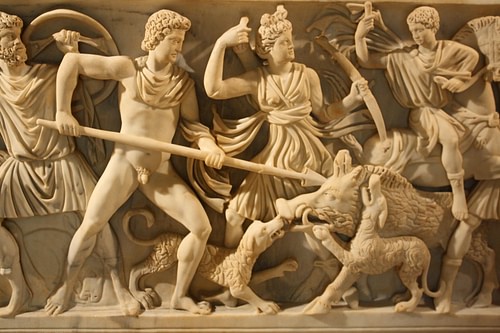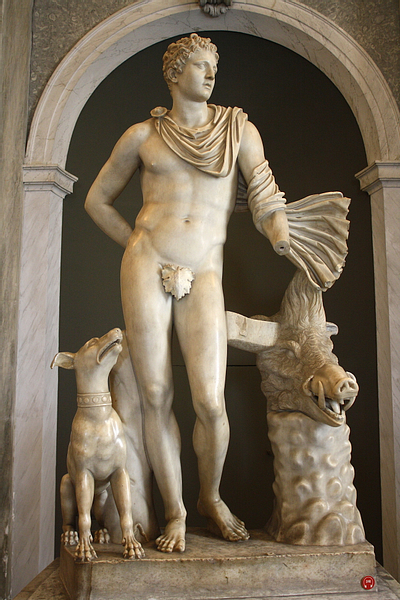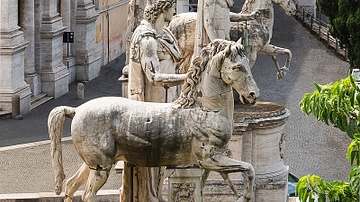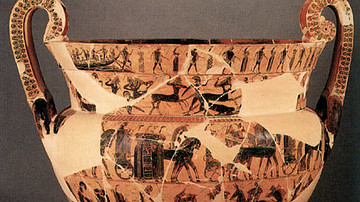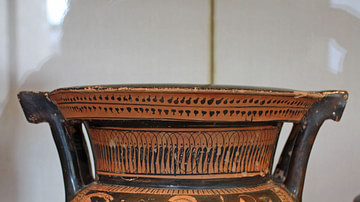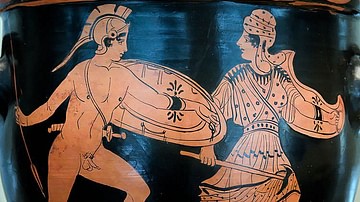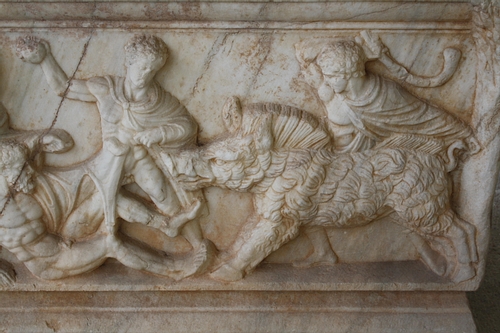
Meleager (Greek: Meleagros) is a hero from Greek mythology who famously led an expedition to kill the Calydonian boar which was terrorizing the kingdom of Oeneus in Aetolia in central-western Greece. Appearing in Homer's Iliad and the later epics the Ehoiai and Minyas, the story was a popular subject in Greek and later art from pottery decoration to sculpted sarcophagi.
The Calydonian Boar Hunt
The story of Meleager is first mentioned in Book 9 of Homer's Iliad, although the oral tradition is likely much older. The tale, modified by Homer, is recounted by Phoenix in order to persuade Achilles to rejoin the fighting during the Trojan War. Achilles was miffed that Agamemnon, leader of the Greek army, had stolen his beautiful war-prize Briseis. With things not going well, the desperate Greeks sent an embassy of Odysseus and Phoenix to convince the greatest Greek warrior to rejoin the fray. Accordingly, Meleager and the Calydonian boar hunt is used as a moral tale to show Achilles the right course of action.
Phoenix tells us that the story is from long ago, the time of heroes. The trouble started when Oeneus (or Oineus) the king of the Aetolians in Calydon (Kalydon) in the central-western part of Greece forgot to make a sacrifice to Artemis. Apparently, the king had made sacrifices to all the other gods of Olympus but for some reason left out the goddess of hunting. Upset at this slight, Artemis sent a huge boar with a bristling hide and great white tusks to terrorize the kingdom. First the beast caused havoc with the king's orchards but then also started killing men when they tried to capture it. Eventually, Oeneus set his son Meleager the task of forming a team of heroes capable of subduing the monster.
Meleager was a great hunter and warrior – indeed, in some versions he is the son of Ares, the god of war – and he had already gained renown as one of the Argonauts who, with their leader Jason, had successfully found the Golden Fleece. Meleager, his all-star heroes team – who included the Dioskouroi, Jason, Theseus, Peleus, and Atalanta in their ranks - and their hounds did kill the boar but, unfortunately, a war broke out over ownership of the head and hide. This war was fought between the Aetolians and local rivals the Curetes (also Kouretes – not to be confused with the Cretan tribe of the same name), the latter besieging the city of Calydon.
Meleager & The Curetes
The war rumbled on and things were not going too badly for the Aetolians as the stout walls of their city resisted everything the Curetes could throw at them. Then, just like Achilles, Meleager got fed up with the fighting and withdrew. He was also angered by his mother, Althaea, who had cursed him for the slaying of his uncle and so, finished with the war, he just wanted to spend more time with his lovely wife, Kleopatra. Without Meleager's fighting skills the Aetolians started to lose the conflict. Embassies were sent to the hero pleading with him to defend his city in its greatest hour of need – his parents, priests, friends, and even his sisters begged him to fight, but this and the promise of great gifts and any part of the kingdom he wished to have failed to move Meleager. Only after Kleopatra pleaded with the hero and reminded him of the terrible fate of a city sacked by its enemies did he finally rejoin the fighting. Donning his shining armour Meleager led the Aetolians to final victory but, as it happened, never received his promised gifts.
Phoenix points out to Achilles that he is making his people suffer unnecessarily just like Meleager and if he joins the fighting again now, then he will not lose out on his promised gifts. In the end, it would be the death of Patroclus, Achilles' great friend, which would persuade him to fight again the Trojans and not this pretty moral tale from Phoenix.
Meleager's Death
In the Greek tradition, Meleager dies, of course, but we do not know in what circumstances, even if some sources declare that he was killed by Apollo. In later traditions, Meleager's death is elaborated upon and we are told that the manner of his death was foretold even before his birth. His mother, Althaea, was warned by the three Fates that her son would live for as long as an ember in her fireplace withstood the flames. Althaea then immediately took the ember, extinguished it and kept it safe in a cupboard. Then, much later and after the successful Calydonian hunt, Meleager killed his two uncles in mysterious circumstances – possibly after they had stolen the boar hide from Meleager's love interest, the warrior Atalanta. The famous huntress had been gifted the hide as a reward for her spear being the first to pierce the boar's thick hide. At the news that her brothers had been killed, Althaea took the ember and rashly threw it into the fire and when it expired so too did Meleager. In dreadful remorse Althaea took her own life.
Meleager does make one final appearance in Greek mythology when he meets the hero Hercules in Hades. Hercules was on his final labour to capture the three-headed dog Kerberos who guarded the gates of Hell. The spirit of Meleager whispered to Hercules to carry a message of love to his sister Deianeira in the world of the living and he recommended his sister for the hero's wife.
Meleager in Art
The story of the Calydonian boar hunt first appeared in Greek art in the 6th century BCE on pottery and it remained a popular subject through to Roman times. One of the earliest certain depictions is on the Francois Vase (570-565 BCE) where the characters and even the dogs are named. In sculpture, the myth was represented on a c. 560 BCE metope on the Treasury of the Sicyonians at Delphi. Perhaps one of the most energetic depictions is on a Roman marble sarcophagus from Vicovaro, now in the Capitoline Museums, Rome. In other art forms, the hero was the title character of Euripides' now lost play Meleager, first performed in 416 BCE.
